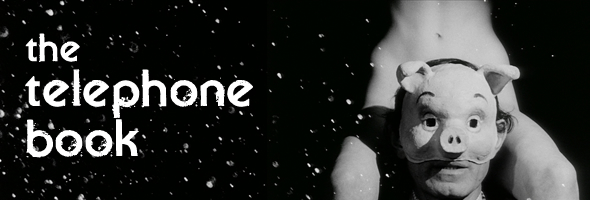
B&W/Color, 1971, 87m.
Directed by Nelson Lyon
Starring Sarah Kennedy, Norman Rose, William Hickey, Barry Morse, Roger C. Carmel, Ultra Violet, Ondine, Dolph Sweet, Jill Clayburgh
Vinegar Syndrome (Blu-Ray & DVD) (US R0 HD/NTSC) / WS (1.85:1) (16:9)
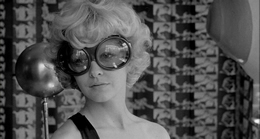 Underground comedies don't come much wilder than The Telephone Book, a New York-lensed oddity that's con
Underground comedies don't come much wilder than The Telephone Book, a New York-lensed oddity that's con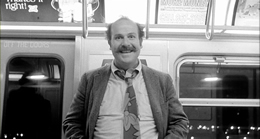 tinuously built up a cult following through word of mouth despite the impossibility of find watchable copies. The film was released in 1971 with an X rating (shortly before that became associated with pornography), and it's absolutely hilarious (as well as completely obsessed with sex from the first frame to the last). Imagine a randy sketch comedy film devised by George Kuchar and Robert Downey Sr. with a little Ralph Bakshi and early Brian De Palma thrown in, and you'll start to get the idea.
tinuously built up a cult following through word of mouth despite the impossibility of find watchable copies. The film was released in 1971 with an X rating (shortly before that became associated with pornography), and it's absolutely hilarious (as well as completely obsessed with sex from the first frame to the last). Imagine a randy sketch comedy film devised by George Kuchar and Robert Downey Sr. with a little Ralph Bakshi and early Brian De Palma thrown in, and you'll start to get the idea.
A cute young blonde named Alice (Laugh-In's Kennedy) finds herself drawn into a wonderland of a very different kind when she gets a life-changing obscene phone call from someone named John Smith (voice over pro Rose, whose entire face is never seen). The experience invigorates her so much that she immediately calls her sexually occupied best friend (Clayburgh!) to gush about it, explaining she has to find this Mr. Smith even if she has to work through every single one listed in the New York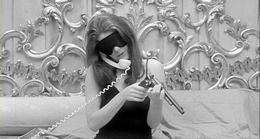 phone book. The quest takes her through a bizarre gallery of characters including a fallen stag filmmaker, Har Poon (The Fugitive and Asylum's Morse), auditioning her for his comeback feature while he's covered in naked women on a mattress (with Warhol Factory vet Ultra Violet wagging her tongue and a whip for good measure). Then there's a shrink (busy TV actor Carmel) who flashes her on the subway but flees in terror when she reciprocates, future Oscar nominee William Hickey (Prizzi's Honor and Puppet Master) delivering monologues while bedridden with an oversized permanent erection, and finally John Smith himself, seen wearing a pig mask and revealing his unusual background while bringing
phone book. The quest takes her through a bizarre gallery of characters including a fallen stag filmmaker, Har Poon (The Fugitive and Asylum's Morse), auditioning her for his comeback feature while he's covered in naked women on a mattress (with Warhol Factory vet Ultra Violet wagging her tongue and a whip for good measure). Then there's a shrink (busy TV actor Carmel) who flashes her on the subway but flees in terror when she reciprocates, future Oscar nominee William Hickey (Prizzi's Honor and Puppet Master) delivering monologues while bedridden with an oversized permanent erection, and finally John Smith himself, seen wearing a pig mask and revealing his unusual background while bringing 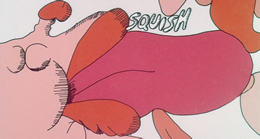 Alice to a higher state of consciousness with his dirty phone call masterpiece.
Alice to a higher state of consciousness with his dirty phone call masterpiece.
Truly alive and wonderful in every scene, The Telephone Book failed to find much critical favor upon its release but has continued to look better and better with each passing year. It easily sits comfortably alongside the works of more famous directors like Dusan Makavejev and John Waters, and it's a shame director Nelson Lyon only went on to become a Saturday Night Live writer in the early '80s rather than writing and directing another feature. There's really no predicting where this film will go, with subtitles wryly commenting on the action at random intervals, familiar character actors popping up in almost every scene, and even a starting shift to color at the end for a long, audacious animated sequence that's far more lewd than anything Disney would dream up. Apparently Joanna's Genevieve Waite was 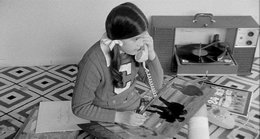 originally cast as Alice, which is easy to believe, but Kennedy is just perfect as the audience surrogate. She's completely upbeat about his libido and personal drives, and her sense of timing results in some terrific laughs where you'd least expect it.
originally cast as Alice, which is easy to believe, but Kennedy is just perfect as the audience surrogate. She's completely upbeat about his libido and personal drives, and her sense of timing results in some terrific laughs where you'd least expect it.
Some truly lousy copies of this film were trading on the gray market circuit for years, which was the only way you could see this film since its theatrical days for many years. The resurrection from Vinegar Syndrome is a major cause for celebration all around, as the Blu-Ray/DVD combo (with the former option definitely being the way to go) looks absolutely fantastic. The original negative is long gone, but the 35mm print is in excellent shape and looks terrific here (except when the visuals and audio are supposed to be deliberately rough, namely the end credits). The big extra here is an audio commentary with producer Merv Bloch and one of the film's biggest champions, Joe Rubin; it's a fast and chatty track covering the filmmaking climate of the time, the solution to dealing with Alice's leftover risque wallpaper, the similarities to the later Last Tango in Paris, connections to The Loved One and the trailer for Cruising, the breaking up of Smith's monologues in the second half, and the famous lost intermission (stupidly cut by the distributor) which originally cut to Andy Warhol eating popcorn. (Bloch aptly notes that this footage would be very, very valuable now if it had actually survived, though you'll find a little remnant of it elsewhere here.) Also included are the artsy original trailer, a much raunchier reissue trailer (as Hot Number), a great stills gallery (with quite a few surprises tucked in), and three and a half minutes of radio spots. Easily one of this year's most essential releases and a major cult title barely saved from oblivion.
Buy from Diabolik DVD.
Reviewed on April 30, 2013.






